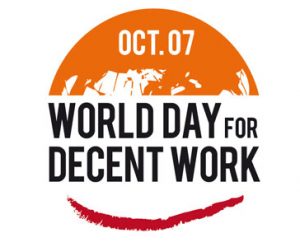 Workers from around the world will be holding activities to mark the 11th World Day for Decent Work on 7 October.
Workers from around the world will be holding activities to mark the 11th World Day for Decent Work on 7 October.
This year’s global theme, “Change the Rules”, highlights the deeply entrenched injustice of the global economic system alongside shrinking democratic space and deteriorating labour rights in many countries, documented in the ITUC Global Rights Index.
“The rules are stacked against working people, and that is why we have unprecedented and destructive levels of economic inequality and insecurity while a small number of global conglomerates like Amazon amass incalculable riches for a very few. There is enough wealth in the world to meet the challenges of our time – creating decent work for all, ensuring universal social protection, tackling climate change and all the other things that need to be done to ensure that people can live in dignity on a sustainable planet. But the rules need to change. And to achieve that, we need to build workers’ power. The World Day for Decent Work is an important milestone on the way to the ITUC World Congress in Copenhagen in December, where we will finalise an ambitious and comprehensive trade union agenda for change and economic renewal,” said ITUC General Secretary Sharan Burrow.
“Since the inaugural World Day for Decent Work in 2008, tens of millions of people have taken part in activities in more than 100 countries to celebrate the achievements of trade unions, to pay homage to those who have sacrificed so much on the front lines of struggles for democratic rights and freedoms, and to advance the cause of social and economic progress which benefits all instead of the privileged elite. This year again, unions and other progressive movements will mobilise around 7 October to show our determination to reclaim democratic space and overhaul the rules of the global economy through organising, campaigning and advocating for a better world.”
With the presidential election in Brazil taking place on 7 October, unions will be stepping up the demand for former President Lula to be released from prison. Lula was unjustly sentenced to a 12-year prison sentence and, while he was by far the most popular candidate, prevented from standing in the election.
